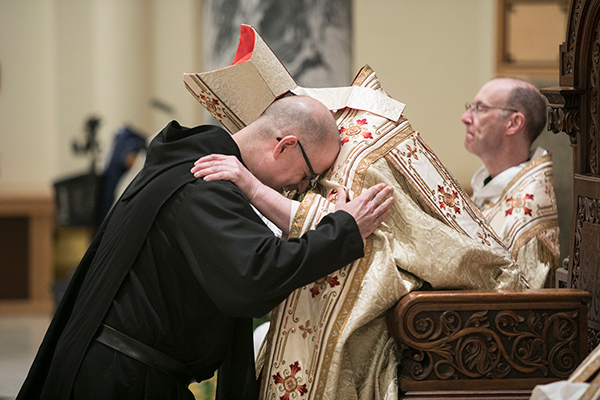Benedictine Patience
Fr. Adrian Burke, OSB
Thursday, July 2, 2020

"...patient in bearing harsh treatment and difficulty...thoroughly tested in patience...supporting one another with the greatest patience...we shall through patience share in the sufferings of Christ..."
Rule of St. Benedict 58.3,11; 72.5; Prol. 50
A word I associate most with Benedictine life is "patience." St. Benedict did not include a chapter on patience in his Rule, but the term seems to rise and fall throughout the text like the refrain of a song or a hymn.
The criterion for accepting a new member into the community is whether he “truly seeks God,” which, writes Benedict, is primarily demonstrated by an eagerness for prayer and, more to the point, by his patience. By patience, he writes, we go to God (RB 58.7-8). But what is patience?
We usually think of patience in terms of an outward calmness when confronted with a frustrating situation or the harsh treatment of others. We think that by remaining calm we are showing patience when, in fact, what we are really showing is calmness. We think patience means one never gets angry or upset. But there is more to it than that.
The word appears many times in the Bible as the Greek word hypomonē. It literally means “to bear up” under trial, to be steadfast and reliant, loyal and unswerving from one’s “purpose” even under great difficulties or sufferings. Benedict teaches that monks demonstrate “good zeal” when bearing with the inconsiderate behaviors and weaknesses of others (RB 72.5), hence good zeal involves patience.
Life is fraught with trials and difficulties. But if we simply run away from hardship and suffering because we hate pain, then we will never know what patience really is. Furthermore, we will miss opportunities to “demonstrate Christ” through patience.
Patience is a choice. How will I respond to this situation, right here, right now? Will I strike back at the person who offended me, or will I allow my “Christian purpose” to affect how I choose to act? Can I endure the upset and allow my better self to opt for a gentle course of action that reflects what I believe about human dignity, both my own and other's?
Every community worthy of the name will present ample opportunity for its members to demonstrate Christ by choosing to act with mercy and compassion, with respectful and understanding patience, despite what we might feel as a result of how we’ve been treated (anger, disappointment, fear, hurt, etc.).
This is the freedom Jesus demonstrated every day of his life, especially that day He chose to endure the suffering of his cross. By grace, we are called to do the same and, through patience, “share in the sufferings of Christ that we may deserve also to share in his kingdom.” (RB Prol. 50)